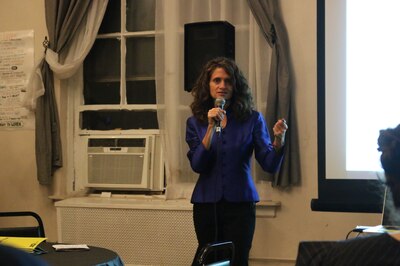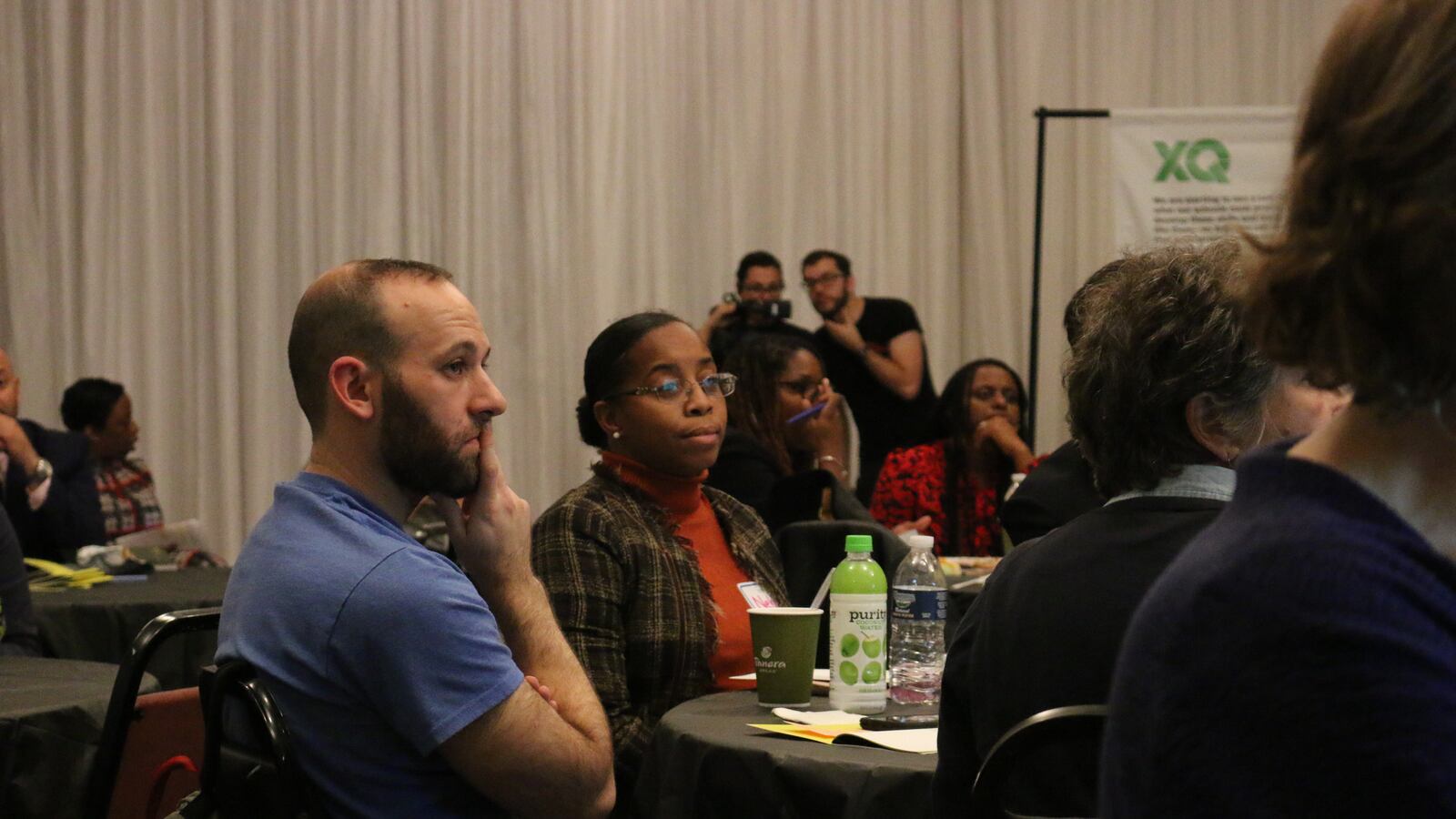Dozens of educators gathered Wednesday in the Bronx where they watched a flashy video that proclaimed American high schools haven’t changed in 100 years and that the next big idea to reinvent schools could come directly from them.
It was the first public information session to explain Mayor Bill de Blasio’s new push to create 20 new schools and 20 restructured schools by the 2022 school year, with $16 million in funding from the XQ Institute (which is backed by Steve Jobs’ widow Laurene Powell Jobs) and the Robin Hood Foundation.
The city is calling for teams of students, parents, and teachers to develop proposals to open or overhaul dozens of schools with an eye toward “innovation” and underserved student groups. Teams will be eligible for up to $500,000 to implement their ideas.
“The question for all of us is how do we ensure that schools prepare students to thrive in a big challenging future?” Karin Goldmark, a top education department deputy, told the crowd at the historic Andrew Freedman house in Concourse. “We’re saying, ‘don’t start with a box.’” She added that the department could help bend rules as long as they don’t violate state law. “We’ll help take on fights where there need to be fights.”
But XQ and education department officials included few specifics about what problems the city is hoping these schools will help solve, what future jobs they should be preparing students for, or the exact criteria that will be used to pick the winners. (Education historians have also disputed the idea that schools haven’t changed at all in the past century.)
Little has been said about where the new schools, 10 of which will be high schools, could be housed or how many students they will serve. Many educators in attendance said they were just learning about the competition for the first time and expressed interest in addressing basic needs, such as more social services and better support for students with disabilities — a contrast with much of the event’s rhetoric about reinventing school.
And despite multiple requests, education department officials have not provided any contracts or grant agreements related to the initiative, officially called “Imagine Schools.” XQ referred requests for those agreements to the education department.
Lucia Orduz, principal at the Bronx’s P.S. 42, said she learned about the initiative through an email newsletter for principals and was intrigued about how it could help her better serve vulnerable students. Almost all of her students come from low-income families, and students are eligible for eyeglasses and free dental checks through the community schools program. Orduz wondered if the competition might help her expand those efforts.
“It’s something we try to do with our school now, but you can only do so much,” she said.
Brooklyn Principal Alison Alexander said she was interested in investing in art and music, dual-language offerings, therapy rooms, and figuring out how to better integrate special education students in mainstream classrooms. “It’s innovative, but it’s not flashy,” said the principal of Williamsburg’s P.S. 18.
Others had ideas about schools to develop from scratch. Keesha Lindsay, a guidance counselor at Kingsbridge International High School, said she is interested in opening an alternative school for new immigrants who have struggled at other city high schools.
Officials said applications “of intent” are due Nov. 12, an apparent extension of the original Nov. 6 deadline, but Goldmark said there will be future rounds were new submissions will be accepted. Teams that submit proposals will be eligible for up to $25,000 in planning grants before official decisions are made about the larger grants of up to half a million dollars.
Sleek XQ pamphlets distributed at every table offered a series of tips for “casting a great team” to come up with a school proposal including a “teaching & learning expert” a “moonshot teammate” — such as “a famous person you might dream of having on board” — or a “historic visionary” which could include a “status quo fighter.”
During a question and answer session with those who attended the event, Goldmark stressed that funding would be one-time only, which means that the schools would not see longer-term changes in their budgets. “It’s like a house you’re renovating: You have to be able to pay the monthly bills before and after the renovation,” she said. Information sessions about the initiative will continue next week.
Officials have largely declined to provide details about how winners will be chosen, or even the extent of the involvement of XQ or Robin Hood in making those decisions. (XQ Institute is supported by Emerson Collective, which is a funder of Chalkbeat through the Silicon Valley Community Foundation.)

Goldmark said XQ and Robin Hood will have a role in choosing the winners that they directly fund, but the education department might decide to fund teams that those philanthropies are less enthusiastic about using the city’s $16 million commitment. She added that “a diverse, cross sectional group” will be involved in making those decisions, including parents and students.
After this story was published, education department spokesman Will Mantell said: “XQ will not decide on whether a project is greenlit; they will decide whether to put their name and financial support behind the 10 of 40 projects they are supporting.”
Pauline James, a Bronx science teacher who attended the event, said she has had a mixed experience with efforts to rethink city schools. She previously taught at the Globe School for Environmental Research, a Williamsbridge school that was in de Blasio’s Renewal program for struggling schools and ultimately merged with a different school in their building.
“One of the things that did not work is changing principals too often,” she said. But despite some skepticism about the level of support schools will receive, James said the event left her feeling excited about the possibility of starting a school from scratch, potentially with some former colleagues from Globe.
“I’m getting a good vibe,” she said.

